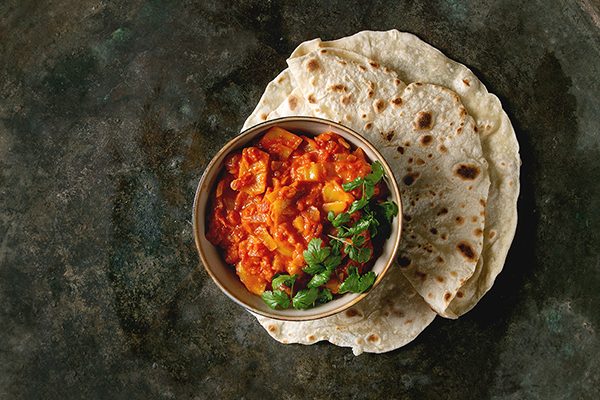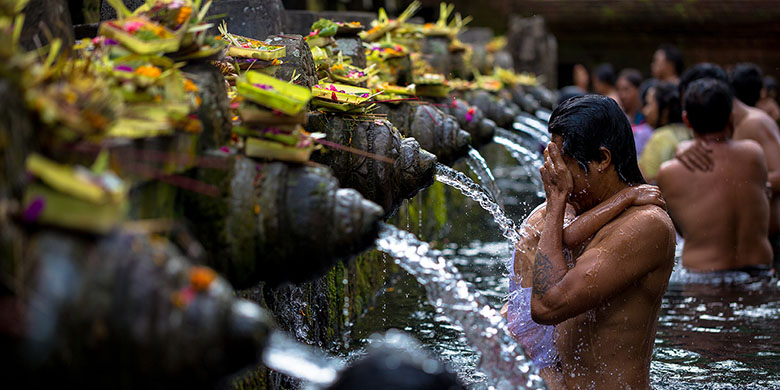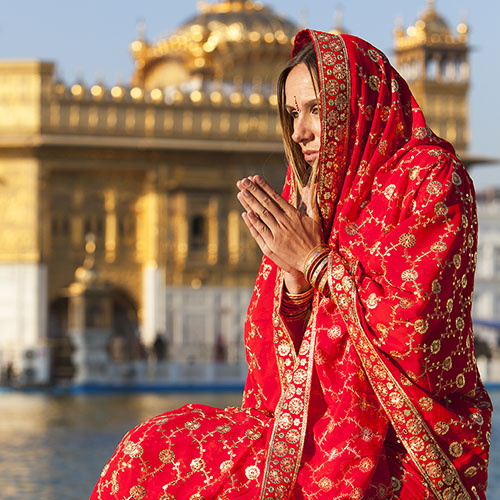Having a stoma can raise a lot of questions, and people may wonder how it will affect their ability to observe religious practices. This series will explore how people of different faiths can ensure their stoma fits harmoniously with their spiritual life and cultural practices. This article in particular will look at issues that may be relevant to Hindus1 and Sikhs2, two religious groups from India with a number of shared roots and values.
Feasting and fasting
Vegetarianism is common among Hindu and Sikh cultures. For Sikhs, this usually means avoiding consuming any product containing meat, fish or gelatine, including medication. However, animal products that are not consumed may be acceptable, including medical devices worn on the skin, such as stoma appliances containing gelatine.
Eating lots of fruit, vegetables and pulses may cause looser output and excess wind, and, very occasionally, odour and gastric discomfort. This can be helped by chewing food thoroughly, not eating too much in one sitting and minimising the amount of onions, mushrooms and green vegetables consumed in the same meal. Ileostomates in particular should avoid sweetcorn and nuts, and skins should be eaten with caution. Certain South Asian diets are rich in fish, which can cause strong odour from a stoma. If you have any issues with flatus or odour, ask your nurse to recommend dietary changes to control wind, provide samples of odour drops for pouches. Nurses can also show you how lighting a match or candle when emptying the pouch at home can reduce odours.
New ostomates should start eating plain food and gradually experiment with reintroducing favourite foods into their diet. Ostomates may benefit from avoiding fizzy drinks, chewing food thoroughly and ensuring that onions and mushrooms are chopped finely and cooked thoroughly.
Some Hindus practice spiritual fasting, such as around the month of Shravan or on particular days of the week. This is generally safe, but it is important to stay hydrated. Drinking only water and eating a single, simple, vegetarian meal each day should not much affect stoma output. However, if you are feeling unwell, it is better to avoid fasting and consider making up for it with prayer or charitable donation.

Many Sikhs and Hindus are vegetarian
Purity and cleanliness
Hindus and Sikhs typically place a high value on external and internal cleanliness, and this can inform their stoma care routine. For example, before entering a temple to worship, Hindu ostomates may wish to put on a fresh stoma pouch, as well as wash and put on clean clothes beforehand. Temples should have a disabled toilet, which is the ideal place to empty or change a pouch.
For Sikhs and Hindus, running water is generally preferred for washing and cleaning, but it may be easier to use a bowl of water for stoma care. Additionally, Hindus and Sikhs prefer to use the right hand for most tasks, especially eating, and save the left hand for tasks that are considered unclean, such as using the toilet. However, caring for and changing a stoma are likely to require both hands.
If receiving a visit from a nurse, it may be worth politely requesting that they remove their shoes before they enter the house, as they may not be familiar with this custom.

Running water is preferred for washing
Clothing and comfort
When praying at home or in the temple, people should not feel compelled to pray in postures that have been made uncomfortable by abdominal surgery, whether sitting, standing or kneeling.
Many Hindus and Sikhs wear traditional Indian garments, especially for religious ceremonies. A sari should cover a stoma pouch without any discomfort or restriction. Likewise, traditional menswear, such as a dhoti or kurta, are unlikely to interfere with the position of a pouch or hinder it from filling. However, when your nurse sites your stoma, it may be worth mentioning any items of clothing that need to be worn for particular ceremonies, so that this can be taken into account.
To become a full member of the Sikh community (Khalsa), both men and women undergo an initiation ceremony called Amrit. Members of the Khalsa are expected to wear five symbolic items, known as the five Ks, at all times. Nurses and health professionals may not be aware of the significance of the five Ks, and there may be occasions where this is worth briefly explaining. For example, when the undergarment (kachera) needs to be changed, the first leg to be taken out of the used garment should be placed into the new one before the used one is removed from the second leg. Therefore, if you need to remove underwear for intimate examinations, such as a smear test, rectal examination or colonoscopy, you may wish to ask for the opportunity to lower the garment as far as possible without removing it or only remove it from one leg.
The five Ks
Kesh Uncut hair worn under a turban or headscarf
Kangha Wooden comb worn in the hair under a scarf or turban
Kara Steel bangle worn on the dominant hand
Kirpan Small dagger worn under clothes or as a necklace Kachera Undergarment worn by both sexes

A sari should cover a stoma pouch without any discomfort or restriction
Conclusion
Practising a faith should not present any barriers to stoma care. In my experience as a stoma nurse, Sikh and Hindu ostomates do not have any more issues with their stoma than anybody else, and I have appreciated how welcome they and their families have made me in their home. Faith and community can be valuable sources of support when dealing with a challenging condition, and integrating our spiritual values with how we care for our bodies can have tangible benefits to quality of life.
References
1. Hall L. A guide to stoma care for Hindu patients. Gastrointestinal Nursing. 2017; 15(7)
2. Hall L. A guide to stoma care for Sikh patients. Gastrointestinal Nursing. 2018; 16(7)

Lisa Hall is a Community Stoma Nurse at Salts Healthcare

